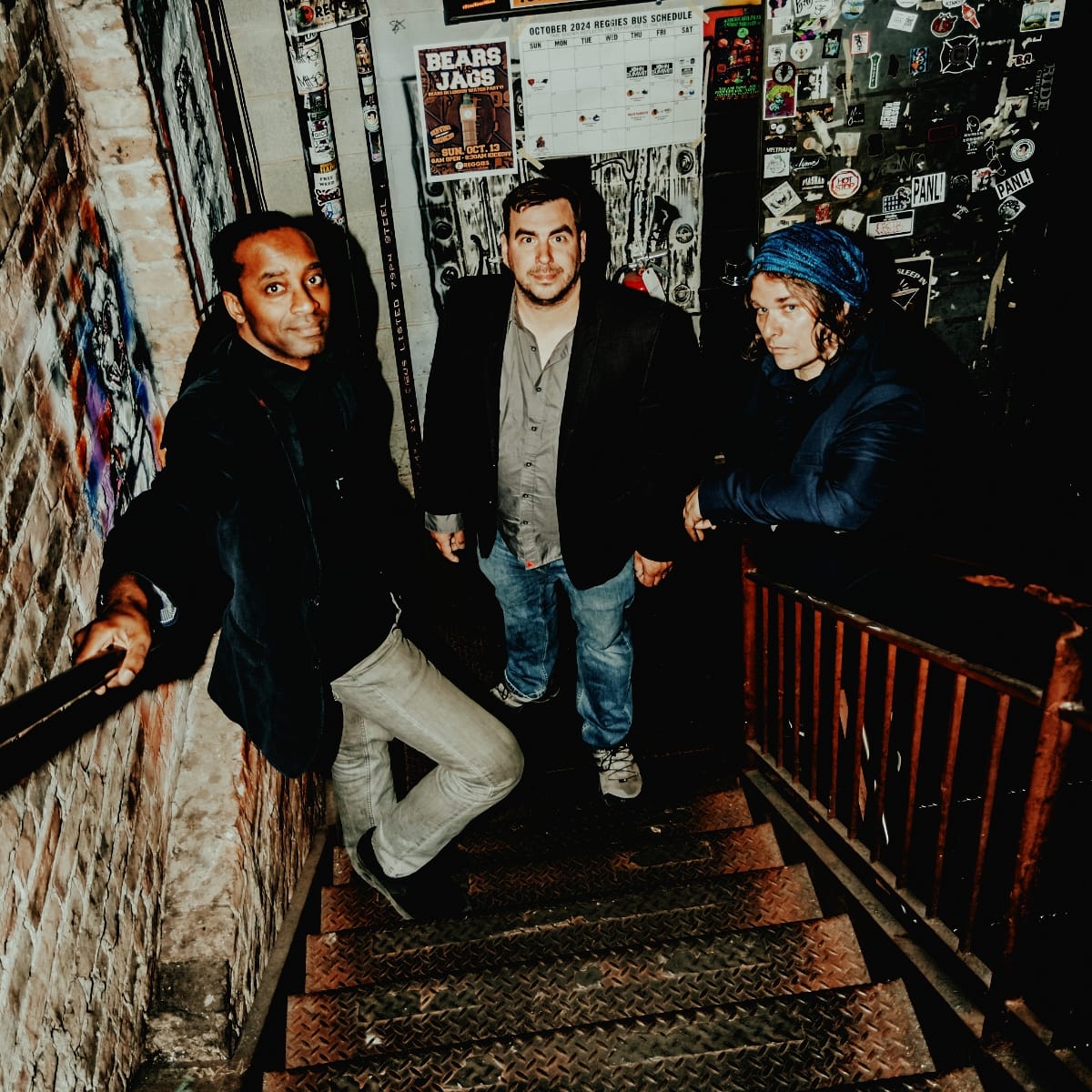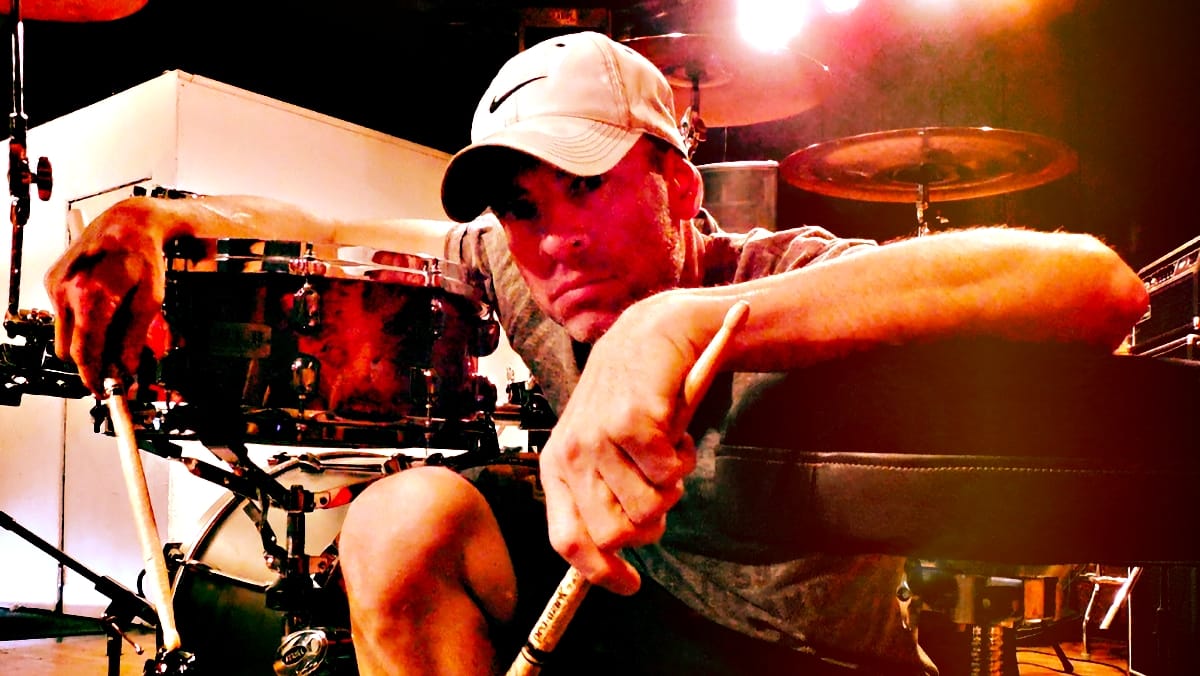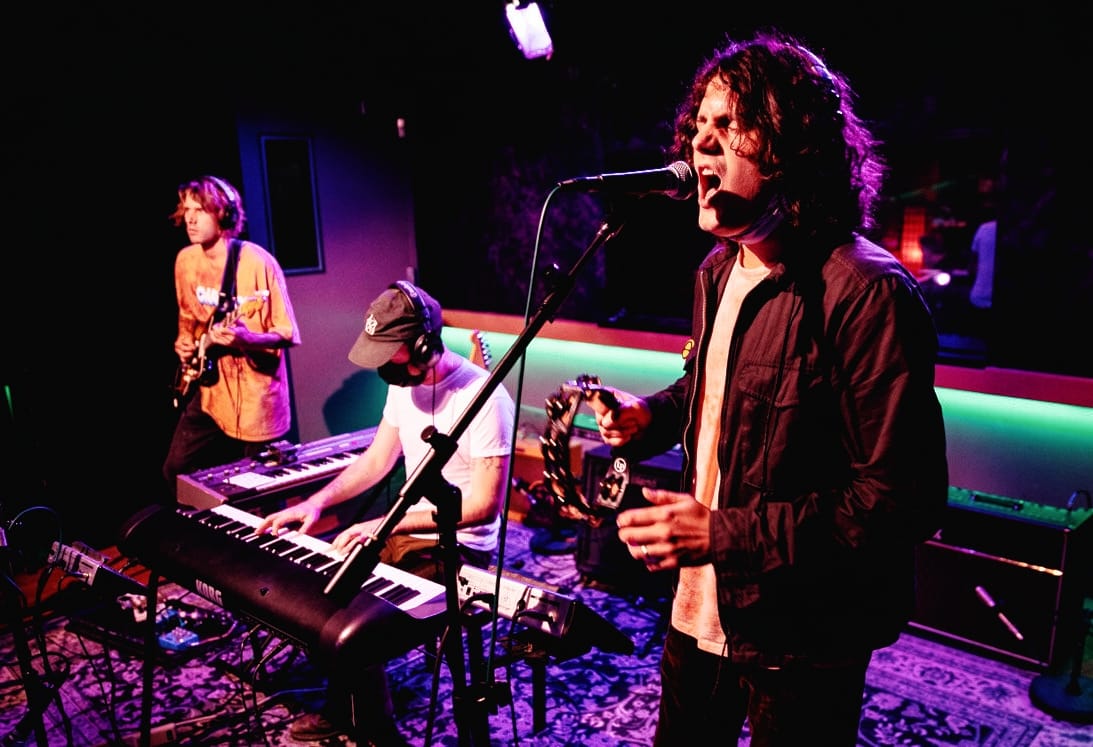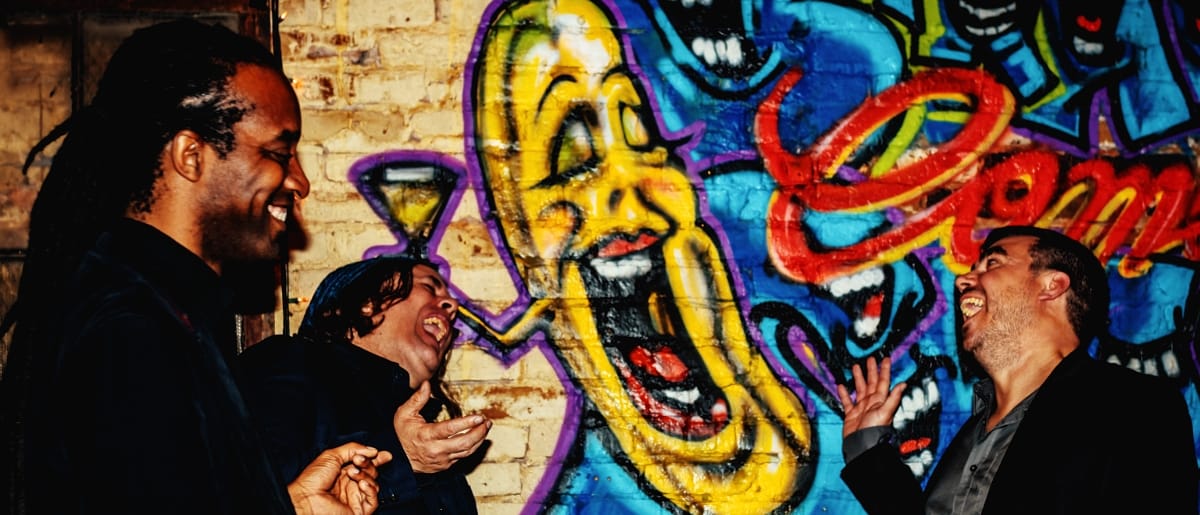When guitarist Erik Oldman Vecchione needed to fill a showcase spot for his roommate in Chicago fifteen years ago, he called bassist/saxophonist Keith Wakefield and a violinist friend for a hastily assembled experimental show over electronic beats. Two weeks of rehearsal later, something clicked on that stage—something that would evolve into Chicago's most enigmatic jazz-adjacent force: Sons of Ra.
Oldman and Wakefield pressed forward while the original violinist and producer departed. Their sound existed somewhere between post-metal's atmospheric density and jazz fusion's technical fluidity, earning them loyal followers from both camps. They became fixtures on bills alongside doom metal acts—not because they played metal, but because their weight operated on a different frequency entirely.
With drummer Mike Rataj joining in 2018, Sons of Ra found their final form: a trio capable of complicated motifs through airy soundscapes, building layers that spoke to their unique position in Chicago's musical ecosystem. Their blue-collar city background is evident in their approach—Wakefield's bass and saxophone work carries the DNA of South Side blues despite its theoretical complexity, while Oldman's guitar work bridges experimental post-progression with studied jazz mastery.
Now signed to Free Electric Sound (a subsidiary of The Laser’s Edge Group), Sons of Ra Sons of Ra are finally issuing a full-length album's worth of their unique blend of heavy jazz/prog-rock after decades of EPs and live recordings. Standard Deviation is a nine-track exhibition of the trio's striking evolution as songwriters and performers, but it's not a complete deviation from the style that's garnered them their passionate following. It's undoubtedly their most intricate and focused work while paying homage to their most significant influences.
In this conversation, the band reveals how this momentous record represents a bold step forward, from their interpretations of Coltrane and Carla Bley to integrating punk and math-rock undercurrents. They also discuss the challenges of arranging around drones and the influence of Chicago's musical community.

Michael Centrone: What inspired the title of your inaugural full-length album?
Erik Oldman: The title is a play on words. It can be interpreted in a few ways, including "standard" in the sense of "jazz standards." It could be a standard of quality we were going for, conceptually, in terms of growth as artists.
We interpret four works by other composers: the perennial "Nature Boy," avant-garde pianist Carla Bley's "Vashkar," a quote of John Coltrane's "Alabama" that expands to an original piece called "Disintegration," and an arrangement of Don Ellis's progressive jazz classic "Upstart." "Deviation" is an exploration of other stylistic elements and musical idioms. We approached writing with more sensibilities within a jazz fusion perspective.
In 2018, Mike Rataj joined the band, bringing a completely different feel through his drumming. We have punk, noise, and math-rock undercurrents that serve as the vital rhythmic foundations for our newer material.
Centrone: How does the new record deviate from your previous releases?
Erik: I see this as a retrospective of Sons of Ra, beginning from when Keith and I started playing jazz standards together acoustically twenty-five years ago to composing things that require us to push ourselves out of our comfort zones. We're not following the pattern of our earlier work of trying to write heavy things in complicated ways. We are heavy when the piece calls for it. We can be dissonant—at times the music can float—and occasionally there's a bit of lightness. We're not proving ourselves as musicians so much as performing in the service of the compositions, so there's more intentionality with the arrangements and layers.
Michael Rataj: This is a great representation of where we have come/grown together as musicians, but not a true standard deviation. This and Tropic of Cancer are the albums we all worked on, so it's more of a cohesive record.
My first album was Cognitive, so from 2020 to now, you can see progress of more instrumentation, loops, and a more dynamic record than just in-your-face songs.
Keith Wakefield: Although this album is jazzier than our other albums, I think it has more variety. For that reason, I think it gives the best 360-degree view of who we are.
Centrone: What were some fun challenges in forming the interpretations of Bley, Coltrane, and Ellis?
Erik: The opening track begins with an interpretation of John Coltrane's tone poem "Alabama," which segues into a darker composition called "Disintegration." That one was fun, as the double bass drone was recorded remotely. The real challenges from an arrangement perspective were using that as the start for the piece. It needed a certain amount of click track to line up. The electric bass guitar and everything else sit above the drone—the drone needs to be present throughout the mix as the fundamental. All the harmonies, lines, solos, et cetera, are structured off of it. It was a challenge to get everything to work from an arranging perspective, but also make sure it didn't get lost in the mix—not a standard rock tune, in that sense.
For Carla Bley, we did two arrangements of her piece "Vashkar." The first half allows the tenor saxophone to take center stage over minimal bass, keys, drums, and percussion. For the second half, we wanted to explore being heavy but not in a stereotypical metal way. I referenced many early-seventies Miles Davis albums and the first Tony Williams Lifetime album as guiding principles. The second half of "Vashkar" is inspired by the Tony Williams version: we incorporated blast beats at a hardcore/thrash tempo into a more free-jazz context.
"Upstart" reflects a significant intersection of our jazz influences. It swings hard as a post-bop piece, but it's in an odd meter and has a lot of delightfully askew elements in terms of harmonic structures. Related to the swinging-ness, we leaned on our early Black Sabbath influences to blend in with the heaviness.
Keith: From a live perspective, I switch between tenor sax and bass guitar on all three of those tracks. That is a fun challenge, using the looping of my bass to help make it happen.
Centrone: How did Spenser Morris contribute to bringing your vision for the album to life?
Erik: Spenser has done live sound for us many times over the seven years we've known him, so he is well-versed in our material. From a guitar perspective, he was the guitar solo adjudicator. I didn't have any preconceived or written-out solos for this album; that was intentional, as I wanted to stay in the moment. So, when it came time for solos, he was the objective audience member and judge. We went bar-by-bar, at times, until it was killer.
Michael: We knew we needed someone with an ear for heaviness, but more so in tone than just heavy distorted guitars. We're moody and dramatic but don't want to sound metal. Then we had outside mixing input to give it more of the jazz album feel, with lots of space and dynamics instead of just fully processed, blaring in your face.
Keith: Spenser was a key ingredient to this album. He not only used his ears to give us great musical input, but his ability to deal with the last-minute overdubs we threw at him was extraordinary. And from an engineering standpoint, I loved the mics he chose for my tenor sax!
Centrone: Which songs on the new record do you look forward to playing live the most?
Michael: They all have their spot. "Porous Silver" is a fun, chill song, but "Outside Looking In" is upbeat and funky. "Don't Know Yet" shows our first live loop, so people love it when they hear Keith's bass loop playing while he picks up a sax and destroys a solo.
I think the fun thing about this band is that, depending on who we're playing with, we can tailor our set to be heavy or chill.

Centrone: Please give a few words about how each guest performer enhanced the album’s story.
Erik: For "Disintegration," the piece evolved from the double-bass drone performed by Stephen Reichelt, my colleague in another project called Mare Crisium.
I listened to John Coltrane's "Alabama" during the pandemic. This was when there were a lot of shootings and violence happening in 2020. The piece resonated with me, and I felt inspired to write something as a continuation. I texted Stephen to play a drone on the piece and mentioned that I could evolve this into something for Sons of Ra. The next day, he emailed me the drone recording, and I started working on transcribing the main melody and writing the body. The drone is the fundamental tone throughout the piece, much like how McCoy Tyner's rumbling piano with the open sustain pedal was the foundation for "Alabama."
"Intrepidation" was a piece I wrote in college. I was studying Afro-Cuban music on percussion, and I wanted to take the piece back to reflect on those experiences in my sessions with a group of master musicians sharing their craft. That came through during the piece's back section courtesy of Paul Abella's percussion work, interweaving with Mike's drums. During our live performances, Keith uses his bass guitar synth with a flute patch to play a solo. He wanted a flautist to create a dialog with his bass solo for the recording.
Isaiah Sanderman also performed a solo section on the flute during "Upstart," which features Paul Abella's rolling percussion work that creates cool rhythmic textures. The intro section for "Vashkar" also features this work.
Centrone: How would you say the city of Chicago influences your music's character and style?
Michael: There's just something about it. It's a big city, yet everyone is nice to each other, relatively speaking. The Chicago music scene is so great that I have seen so many different styles of live music, and from each one I took a little piece for something to use moving forward. With that supply of talent, it's immensely inspiring.
Keith: If you dig past the chords and scales, my style is without a doubt blues-based. You'll hear it in my bass, you'll hear it in my sax. That comes from my earliest memories of listening to music with my grandma on the South Side of Chicago.
Centrone: Please describe Sons of Ra at leisure—interesting hobbies, routines, et cetera.
Erik: Cheese! Coffee! Whiskey! Urban gardening!
Keith: Yeah, all that, plus sci-fi!
Visit Sons of Ra at sonsoframusic.com and follow the band on Instagram, Facebook, and YouTube. Purchase Standard Deviation from Bandcamp or Qobuz and listen on your streaming platform of choice.
Check out more like this:
 The TonearmMichael Centrone
The TonearmMichael Centrone
 The TonearmPeter Thomas Webb
The TonearmPeter Thomas Webb






Comments